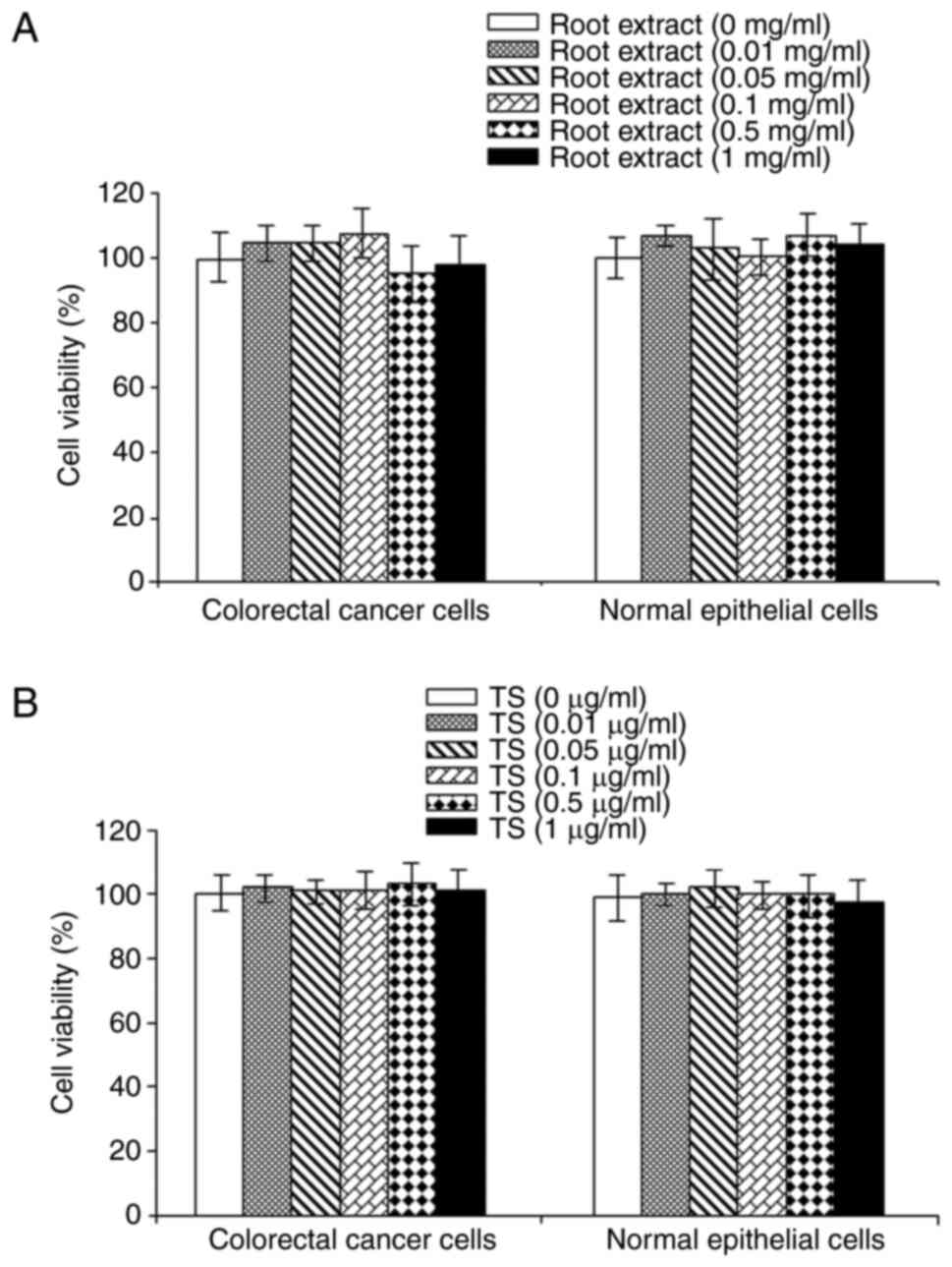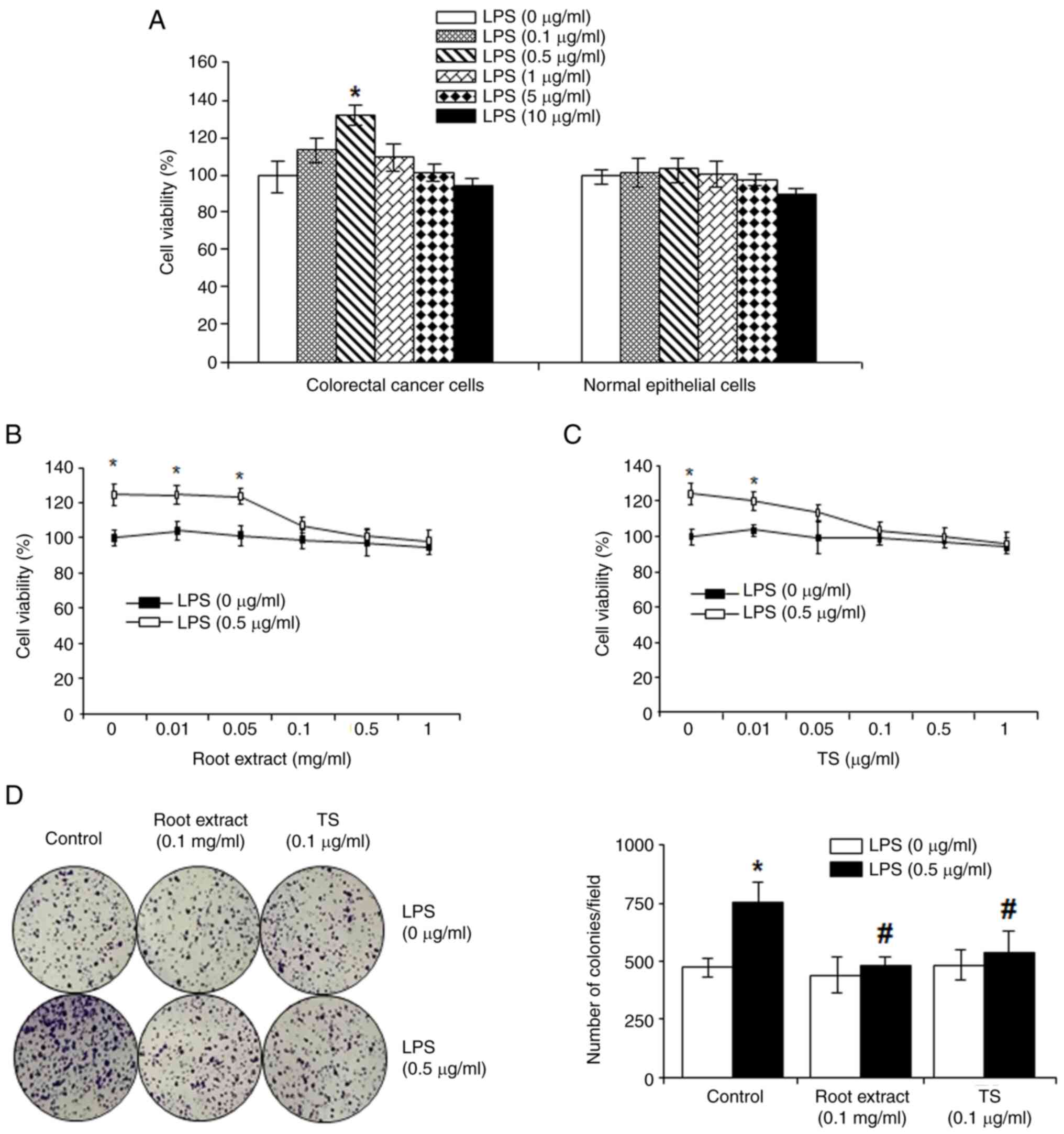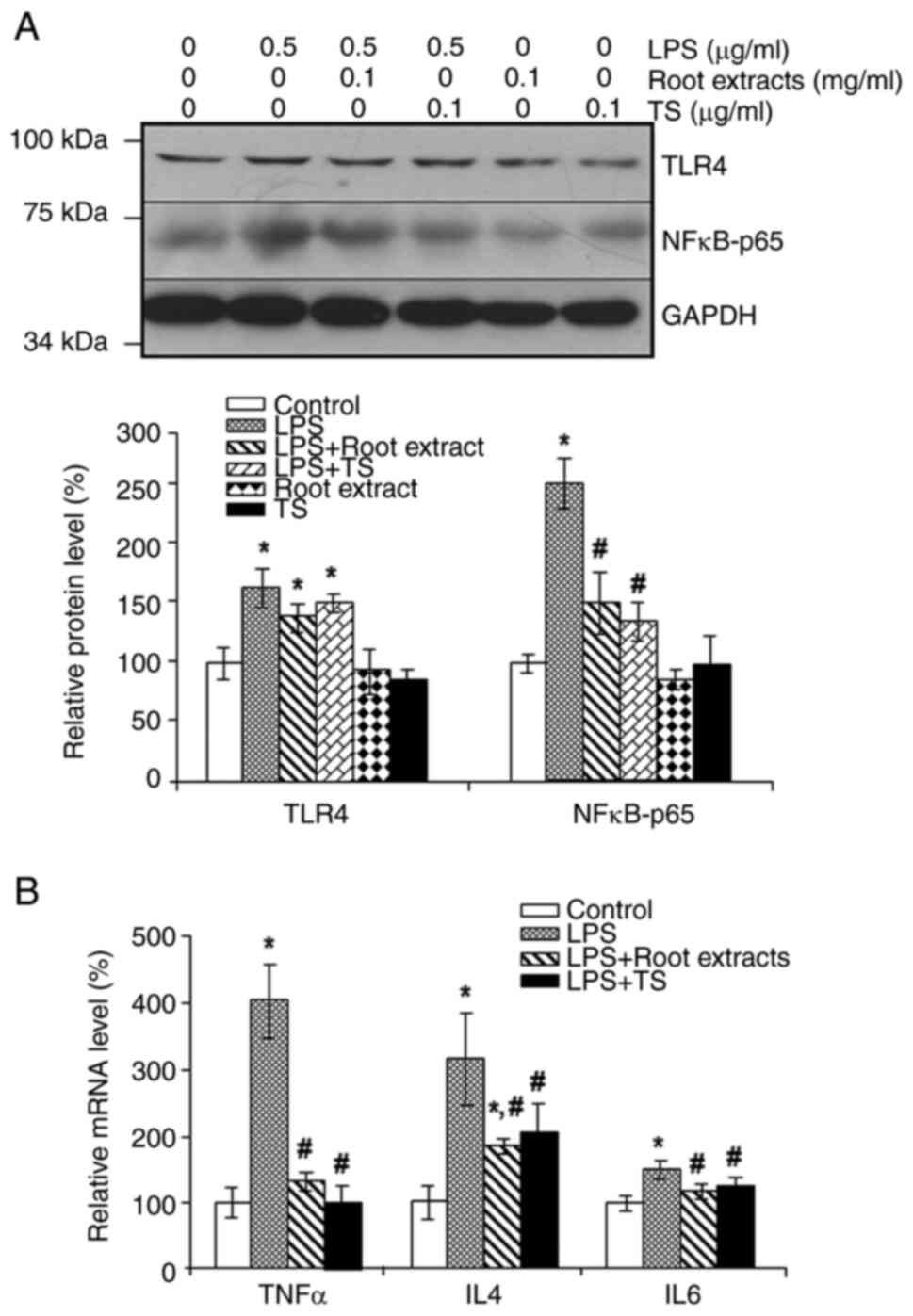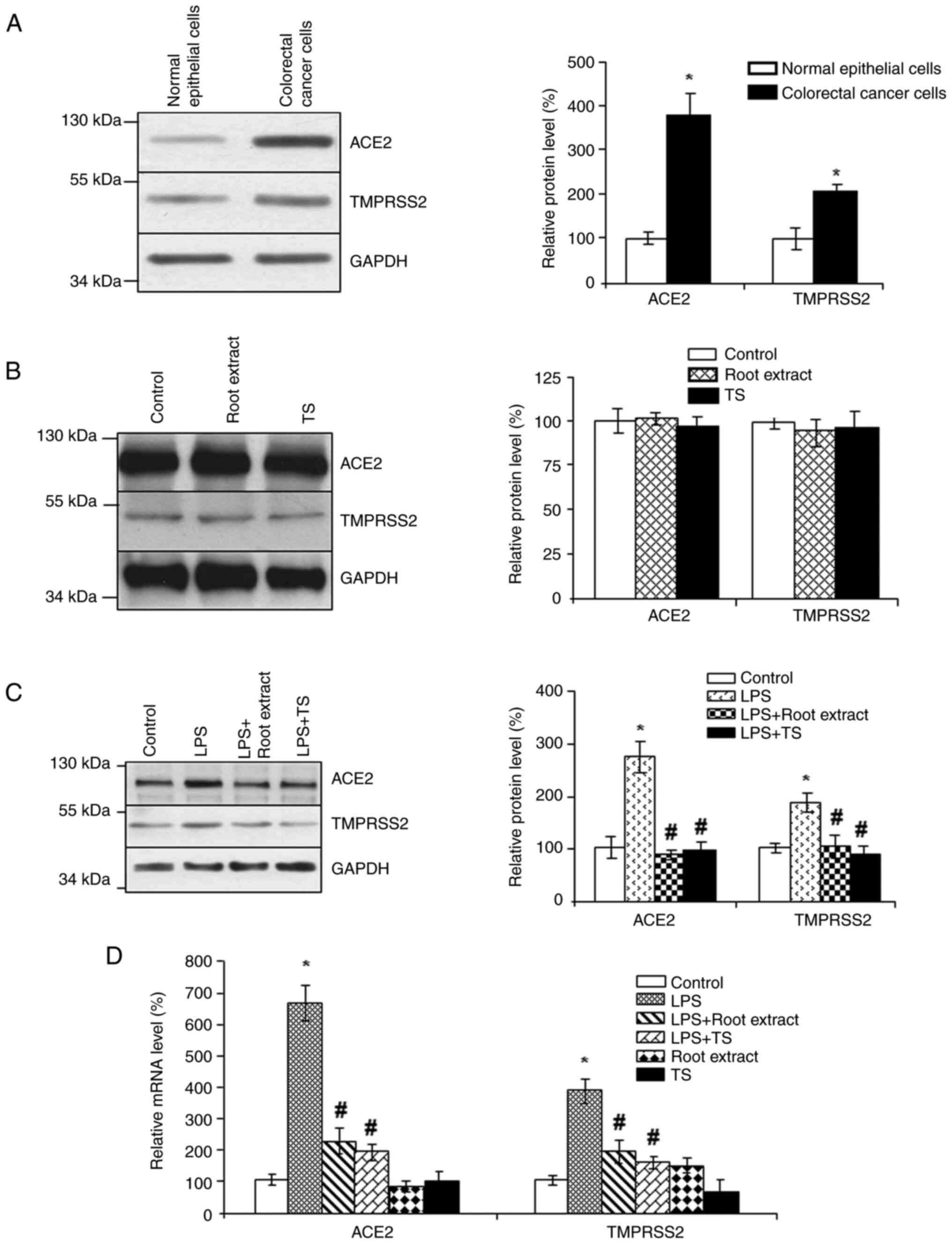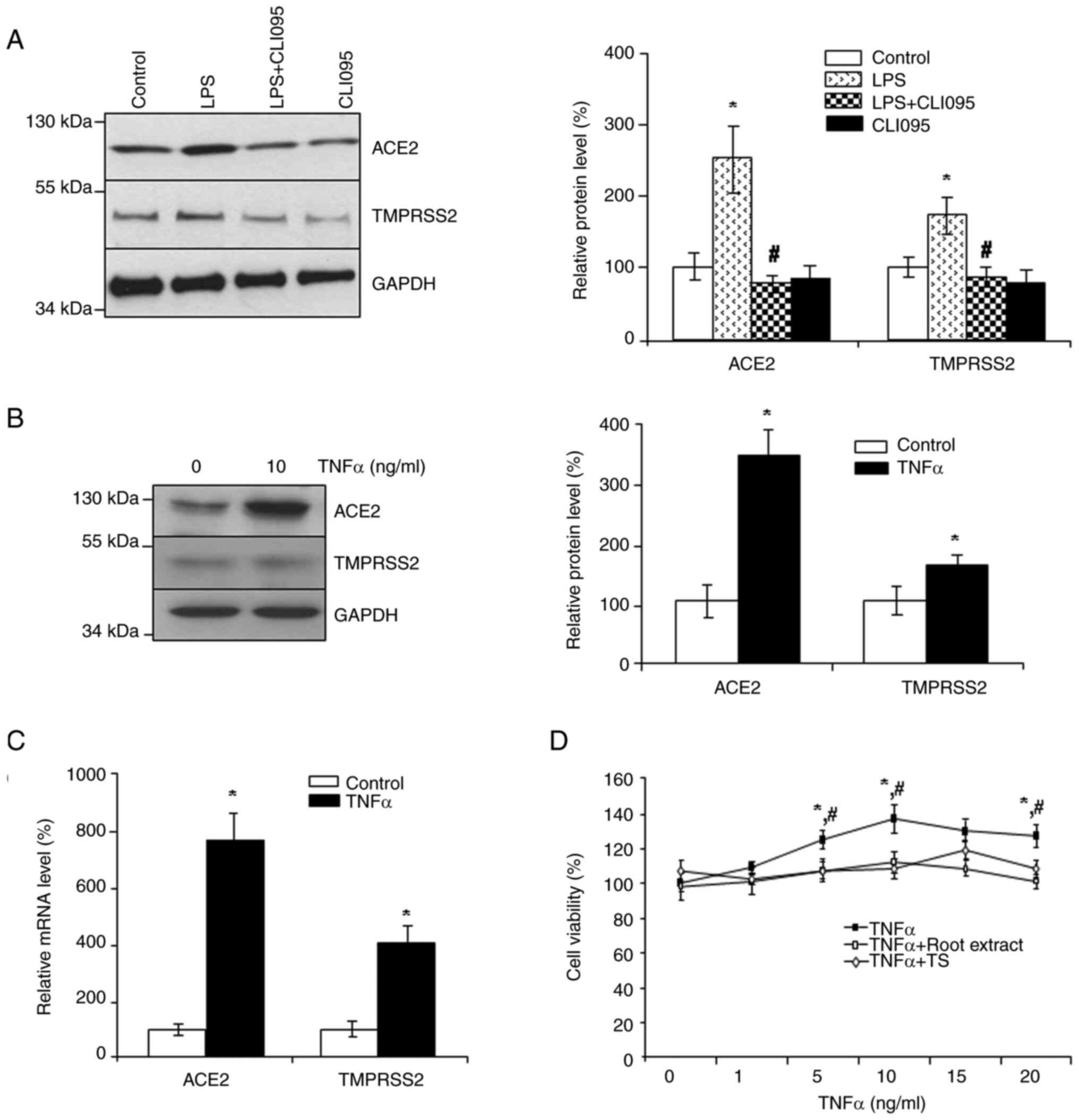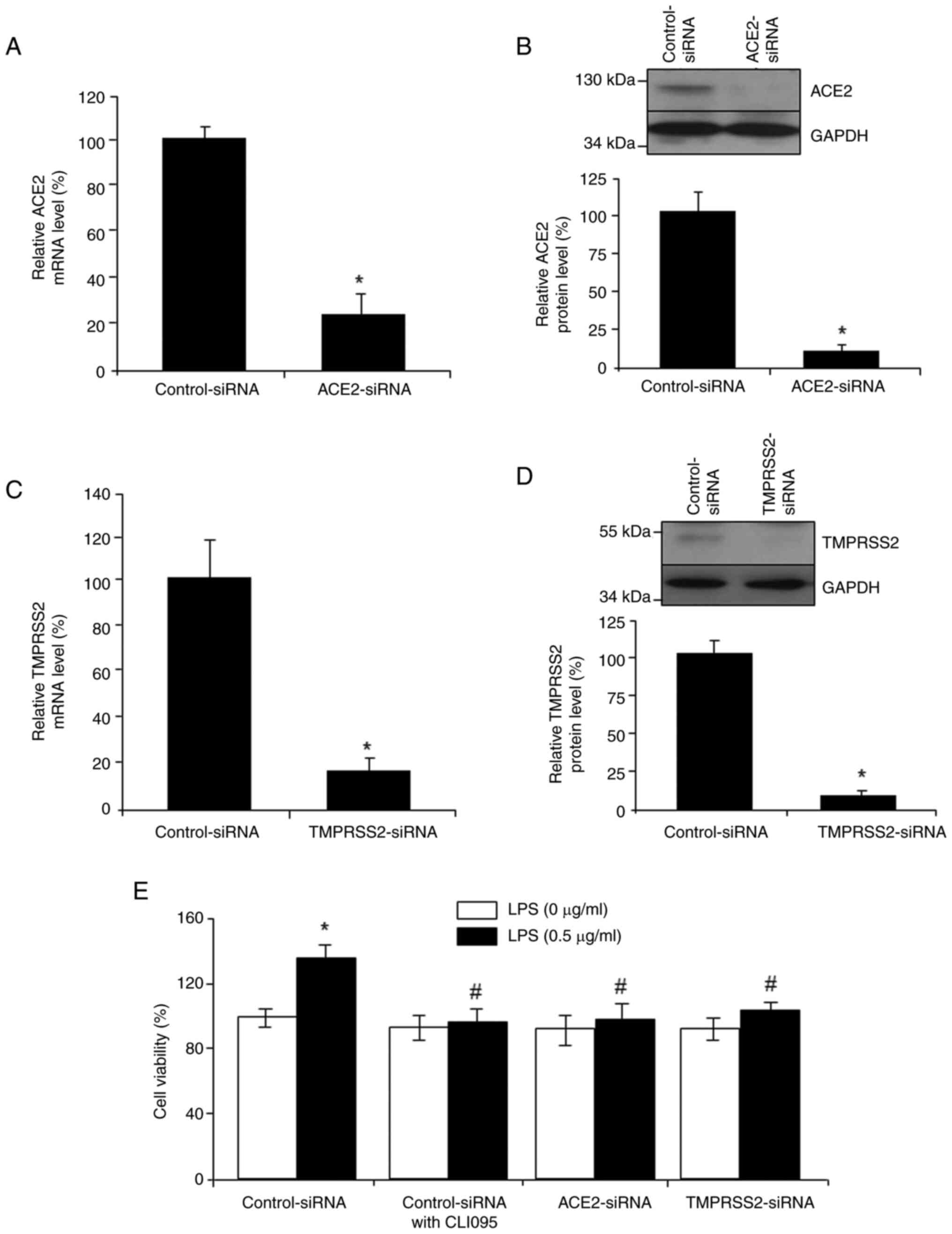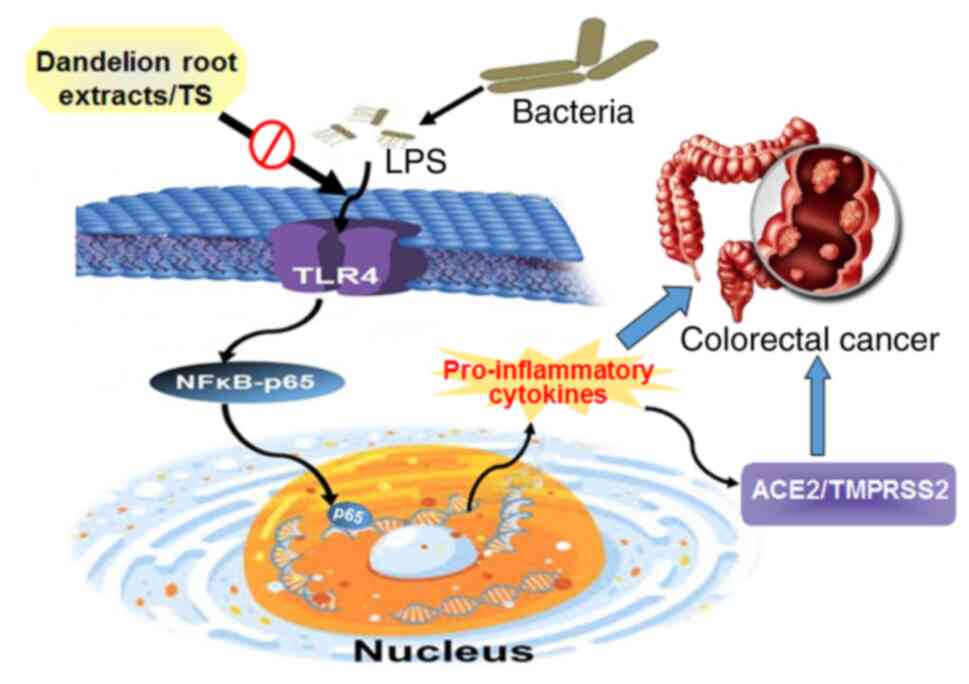Introduction
Colorectal cancer is the fourth leading cause of
cancer-related death worldwide, and the incidence of colorectal
cancer has increased rapidly in the past few years (1). According to the World Health
Organization, >1.9 million new cases of colorectal cancer and
approximately 1 million deaths due to colorectal cancer occurred
worldwide in 2020. Several risk factors are associated with the
initiation and progression of colorectal cancer, including age,
sex, ethnicity, dietary habits, colon polyps and long-lasting
ulcerative colitis (2,3). There is a growing body of evidence
suggesting that the high density of bacteria in the colon serves an
important role in colorectal cancer tumorigenesis (4-6).
The gut microbiota is vital for human health through the regulation
of food digestion and energy metabolism, maintenance of gut
homeostasis, and modulation of host immunity (7,8).
However, abnormalities in the intestinal microbiota composition
caused by lifestyle habits, food intake, age and/or environmental
factors may lead to an imbalance in bacterial populations, thus
resulting in the overproduction of pro-inflammatory and
pro-carcinogenic toxins that promote colorectal carcinogenesis
(5,9,10).
Lipopolysaccharide (LPS) is a bacterial endotoxin and a highly
potent pro-inflammatory molecule, which is often implicated in
tumorigenesis (11,12). LPS has been reported to be elevated
in patients with colorectal cancer (13-15).
The binding of LPS to toll-like receptor 4 (TLR4) in intestinal
epithelial cells activates the NFκB pathway, resulting in increased
expression and secretion of pro-inflammatory mediators, and
contributing to the occurrence, development and metastasis of
various tumors, including colorectal cancer and liver tumors
(16,17).
The receptor angiotensin-converting enzyme 2 (ACE2)
and transmembrane serine protease 2 (TMPRSS2) are abundantly
expressed in the colon, and have been shown to be upregulated in
human colon carcinoma (18-20).
LPS and some cytokines (TNFα, IL4 and IL6) can alter the expression
levels and activities of ACE2 and TMPRSS2(21). ACE2 and TMPRSS2 are also known as
host proteins for the entry of severe acute respiratory syndrome
coronavirus 2 (SARS-CoV-2) into human cells causing
COVID-19(22), and blockage of
ACE2 or TMPRSS2 can suppress the infection of human epithelial
cells with SARS-CoV-2(23).
Notably, patients with colorectal cancer are more likely to develop
severe gastrointestinal symptoms and experience an increased risk
of death compared with healthy individuals infected with SARS-CoV-2
(20,24). These findings indicate a potential
association between ACE2 and TMPRSS2 and colorectal cancer.
Dandelions have been used as a popular herbal
medicine for centuries, and have been reported to protect against
inflammation, digestive diseases and cancer (25,26).
Dandelion root extracts have been shown to selectively suppress
colorectal cancer cell proliferation but have no detrimental
effects on normal colon epithelial cells (27). In addition, dandelion root extract
has been shown to protect against stress-induced colitis in mice
(28). Phytochemical analysis has
identified taraxasterol (TS) as a pharmacologically active compound
obtained from dandelion root extracts, which may reduce colorectal
cancer cell viability and inhibit colonic epithelial cell
inflammation (27,29). In addition, TS has been widely
reported to attenuate LPS-induced oxidative stress and inflammation
in in vitro cell culture and in vivo animal models
(30-32).
However, to the best of our knowledge, the regulatory roles of
dandelion root extracts and TS in bacteria-driven colorectal cancer
cell viability have not been investigated. The present study
explored the protective effects of dandelion root extracts and TS
on LPS-induced colorectal cancer cell viability, as well as the
underlying mechanisms.
Materials and methods
Preparation of dandelion root
extracts
Dandelions (Taraxacum officinale) were
collected from yards and fields in Sudbury (latitude 46.4917˚ N;
longitude 80.9930˚ W), Ontario, Canada. The water extracts of
dandelion roots were prepared as described previously (33). Briefly, the air-dried dandelion
roots were extracted in boiling water for 4 h. The extracts were
first filtered through Whatman filter paper and concentrated. The
dried extracts were then weighed and dissolved in distilled water
followed by filtration through a 0.2-µm filter. Finally, the
aqueous extracts of dandelion roots were stored at 4˚C for the
following experiments.
Cell culture
Human colorectal cancer cells (WiDr; cat. no.
CCL-218) and normal intestinal epithelial cells (FHC; cat. no.
CRL-1831) were purchased from American Type Culture Collection.
According to the information from American Type Culture Collection,
DNA fingerprinting has shown WiDr cells to be a derivative of the
HT-29 cell line (cat. no. HTB-38), which was originally isolated
from the colon of a female patient with colorectal adenocarcinoma.
The cells were incubated in Dulbecco's modified Eagle's medium
(MilliporeSigma) supplemented with 10% fetal bovine serum, 100 U/ml
penicillin and 100 µg/ml streptomycin (all Thermo Fisher
Scientific, Inc.) in a humidified atmosphere of 5% CO2
at 37˚C. The experiments were performed when the cells reached
70-80% confluence.
Cell viability assay
Cell viability was assessed using the MTT assay as
described previously (34). In
this assay, the living cells can convert MTT to purple formazan
crystals. Briefly, equal numbers of cells (1x104) were
seeded in each well of a 96-well plate for 24 h. After the cells
were treated with dandelion root extracts (0.01-1 mg/ml), TS
(0.01-1 µg/ml), LPS (0.1-10 µg/ml) and/or TFNα (1-20 ng/ml) for 24
h at 37˚C, MTT (0.5 mg/ml) was added to each well and the cells
were then cultured at 37˚C for an additional 4 h, after which, 100
µl dimethyl sulfoxide was added for 5 min to dissolve the purple
formazan. The absorbance at 570 nm was measured using a FLUOstar
OPTIMA microplate reader (BMG Labtech GmbH). The control cells
without any treatment were considered 100% viable.
Colony formation assay
Human colorectal cancer cells (1x105)
were treated with or without 0.5 µg/ml LPS (MilliporeSigma) for 24
h at 37˚C. Subsequently, the medium was discarded, and fresh medium
containing root extracts (0.1 mg/ml) or TS (0.1 µg/ml;
MilliporeSigma) was added for an additional 14 days at 37˚C.
Afterwards, the medium was aspirated and the cells were fixed with
cold 100% methanol for 10 min at room temperature. The cells were
then stained with 0.01% crystal violet for 60 min at room
temperature. After washing with PBS, images of the plates were
captured to count the number of colonies formed using ImageJ 1.43
software (National Institutes of Health). Clusters of ≥50 cells
were considered a colony.
Detection of protein expression levels
by western blotting
After the cells were treated with dandelion root
extracts (0.1 mg/ml), TS (0.01 µg/ml), LPS (0.5 µg/ml), TNFα (10
ng/ml) and/or CLI095 (10 µM) for 24 h at 37˚C, the cultured cells
were collected for protein analysis by western blotting as
described previously (34,35). Briefly, the cells were lysed with
radioimmunoprecipitation assay buffer supplemented with a protease
inhibitor cocktail (MilliporeSigma) for protein extraction. Protein
concentrations were determined with BCA assays (Thermo Fisher
Scientific, Inc.). Equal amounts of proteins (90 µg/well) were then
separated by SDS-PAGE on 10% gels and were transferred to
nitrocellulose membranes (Pall Corporation). The membranes were
first blocked with PBS-0.1% Tween 20 containing 3% skim milk at 4˚C
overnight. The membranes were then incubated with appropriate
primary antibodies for 90 min at room temperature. The following
primary antibodies were used: TLR4 (cat. no. 38519; 1:1,000; Cell
Signaling Technology, Inc.), NFκB-p65 (cat. no. 8242; 1:1,000; Cell
Signaling Technology, Inc.), ACE2 (cat. no. 4355; 1:1,000; Cell
Signaling Technology, Inc.), TMPRSS2 (cat. no. PAB11593; 1:1,000;
Abnova) and GAPDH (cat. no. 97166; 1:5,000; Cell Signaling
Technology, Inc.). After 3 times washing with PBS-0.1% Tween 20
containing 3% skim milk, the membranes were incubated with
peroxidase-conjugated secondary antibodies (cat. no. AP132P or
AP160P; 1:5,000; MilliporeSigma) for 90 min at room temperature
followed by 3 times washing with PBS-0.1% Tween 20. The protein
bands in the membranes were then visualized using ECL solution
(Bio-Rad Laboratories, Inc.) in a dark room with an X-ray film. The
densitometry of the band for each target protein was analyzed using
ImageJ 1.43 software by normalizing to the intensity of GAPDH.
Analysis of mRNA expression levels by
reverse transcription- quantitative PCR (qPCR)
After the cells were treated with LPS (0.5 µg/ml)
with or without dandelion root extracts (0.1 mg/ml) and TS (0.01
µg/ml) for 24 h at 37˚C, the cells were collected for isolation of
total RNA using TRI reagent (MilliporeSigma). The RNAs were
reversed transcribed to cDNA using a Verso cDNA synthesis kit
according to the manufacturer's instructions (Thermo Fisher
Scientific, Inc.). The mRNA expression levels were quantified with
SYBR Green PCR Master Mix (Thermo Fisher Scientific, Inc.) using a
CFX Real-Time PCR Detection System (Bio-Rad Laboratories, Inc.).
Samples that were not treated with reverse transcriptase were
included as negative controls of genomic DNA contamination. The
following primers were used in the present study: TNFα forward,
5'-GGGCTCCAGGCGGTGCTTGTTC-3' and reverse,
5'-GCGGCTGATGGTGTGGGTGAGG-3'; IL4 forward,
5'-ACTGCTTCCCCCTCTGTTCTTCC-3' and reverse,
5'-GAGGTTCCTGTCGAGCCGTTTCA-3'; IL6 forward,
5'-AAAGAGGCACTGGCAGAAAACAAC-3' and reverse,
5'-TTAAAGCTGCGCAGAATGAGATGA-3'; ACE2 forward,
5'-CCGCGGCCAGTTGATTGA-3' and reverse,
5'-ACATTTCCTGGGTCCGTTAGCAT-3'; TMPRSS2 forward,
5'-CACGCAGCCCAAATCCCCATCC-3' and reverse,
5'-GCCGCCCGCCCGTAGTTCTC-3'; and GAPDH forward,
5'-CGGGGCTCTCCAGAACATCAT-3' and reverse,
5'-CCAGCCCCAGCGTCAAAGGTG-3'. The qPCR program was as follows: One
cycle at 94˚C for 5 min, 35 cycles at 94˚C for 20 sec, 62˚C for 30
sec and 72˚C for 30 sec, and a final step for melting curve
determination (94˚C for 15 sec, increasing from 60˚C to 94˚C in
0.5˚C/15 sec increments). Relative mRNA quantification was
performed using the 2-ΔΔCq formula (36) by normalizing to the endogenous
reference gene GAPDH.
Small interfering RNA (siRNA)
transfection
The knockdown of ACE2 and TMPRSS2 was conducted
using pre-designed siRNAs from Santa Cruz Biotechnology, Inc. A
control-siRNA (cat. no. sc-37007) with a scrambled sequence that
would not lead to the specific degradation of any cellular messages
acted as a non-targeting control. ACE2-siRNA (cat. no. sc-41400)
and TMPRSS2-siRNA (cat. no. sc-41658) consisted of pools of three
to five target-specific 19-25 nucleotide sequences. Transfection of
the cells with siRNAs was achieved using Lipofectamine®
2000 (Thermo Fisher Scientific, Inc.) according to the
manufacturer's protocol. Briefly, the cells were plated overnight
to form 60-70% confluent monolayers. After colorectal cancer cells
were transfected with control siRNA (100 nM) or ACE2 siRNA/TMPRSS2
siRNA (100 nM) for 24 h at 37˚C, the cells were then incubated with
LPS (0.5 µg/ml) and/or CLI095 (10 µM) for additional 24 h at
37˚C.
Statistical analysis
Data are presented as the mean ± standard error of
at least three independent experimental repeats. Statistical
analyses were conducted using SPSS 21.0 software (IBM Corp.).
Unpaired Student's t-test was applied to analyze statistically
significant differences between two groups, and one-way analysis of
variance followed by the Tukey's test was used to analyze
differences among more than two groups. P<0.05 was considered to
indicate a statistically significant difference.
Results
Dandelion root extracts and TS inhibit
the LPS-induced viability of colorectal cancer cells
When both human colorectal cancer cells and normal
epithelial cells were incubated with either dandelion root extracts
(0-1 mg/ml) or TS (0-1 µg/ml) for 24 h, the cell viabilities were
not changed compared with those of the control cells without any
treatment (Fig. 1A and B). The cell viability of control cells
was set at 100%, and subsequently, it was shown that LPS at a low
concentration (0.5 µg/ml) significantly enhanced the viability of
colorectal cancer cells by 32%, whereas a lower (0.1 µg/ml) or
higher dose (1, 5 and 10 µg/ml) of LPS had no effect on the
viability of colorectal cancer cells (Fig. 2A). LPS at all tested doses (0.1,
0.5, 1, 5 and 10 µg/ml) did not affect the viability of normal
epithelial cells. The addition of dandelion root extracts at a
concentration of >0.1 mg/ml (Fig.
2B) or TS at concentration of >0.05 µg/ml (Fig. 2C) significantly suppressed the
stimulatory effect of LPS (0.5 µg/ml) on the viability of
colorectal cancer cells. Increasing the concentration of dandelion
root extracts to 0.5 and 1 mg/ml, or the concentration of TS to
0.1, 0.5 and 1 µg/ml did not further inhibit LPS-induced cell
viability. By contrast, dandelion root extracts at a concentration
<0.1 mg/ml or TS at a concentration <0.05 µg/ml had no effect
on LPS-induced cell viability (0.5 µg/ml). Therefore, in the
following experiments, the concentrations of dandelion root
extracts and TS were chosen as 0.1 mg/ml and 0.1 µg/ml, since both
doses were able to bring the cell viability to the basal level. It
was further observed that the number of colonies formed in LPS (0.5
µg/ml)-treated colorectal cancer cells was 1.6 times that formed in
the control cells, which was significantly reduced by co-incubation
with root extracts (0.1 mg/ml) or TS (0.1 µg/ml) for 14 days
(Fig. 2D). Root extracts or TS
alone had no effect on colony formation in comparison with the
control cells.
Dandelion root extracts and TS inhibit
LPS-stimulated TLR4/NFκB-p65 signaling
LPS (0.5 µg/ml) significantly increased the protein
expression levels of TLR4 and NFκB-p65, and the supplementation of
dandelion root extracts (0.1 mg/ml) or TS (0.1 µg/ml) decreased the
expression levels of NFκB-p65 but not TLR4 (Fig. 3A). The dandelion root extracts or
TS alone had no effect on the protein expression levels of TLR4 and
NFκB-p65. As shown in Fig. 3B, LPS
(0.5 µg/ml) markedly increased the mRNA expression levels of TNFα,
IL4 and IL6, which could be significantly inhibited by the
supplementation of dandelion root extracts (0.1 mg/ml) or TS (0.1
µg/ml).
Dandelion root extracts and TS
suppress LPS-induced ACE2 and TMPRSS2 expression
ACE2 and TMPRSS2 were expressed in both normal
epithelial cells and colorectal cancer cells (Fig. 4A). Compared with those in normal
epithelial cells, the protein expression levels of ACE2 and TMPRSS2
were significantly higher in colorectal cancer cells. Dandelion
root extracts or TS alone had no effect on the protein expression
levels of ACE2 and TMPRSS2 in colorectal cancer cells (Fig. 4B). By contrast, LPS (0.5 µg/ml)
significantly increased the protein expression levels of ACE2 and
TMPRSS2, which could be blocked by the addition of dandelion root
extracts (0.1 mg/ml) or TS (0.1 µg/ml) in colorectal cancer cells
(Fig. 4C). Similarly, the mRNA
expression levels of ACE2 and TMPRSS2 were markedly increased in
LPS-treated colorectal cancer cells, whereas co-incubation with
dandelion root extracts and TS suppressed the LPS-induced increase
in ACE2 and TMPRSS2 transcript levels (Fig. 4D).
Blockage of TLR4/NFκB signaling
attenuates LPS-induced ACE2/TMPRSS2 expression and LPS/TNFα-induced
cell viability
Incubation of colorectal cancer cells with 10 µM
CLI095, a TLR4 signaling inhibitor, significantly reversed the
LPS-induced increase in the expression levels of ACE2 and TMPRSS2
(Fig. 5A). By contrast, treatment
with TNFα, a downstream molecule of TLR4/NFκB, significantly
increased the protein and mRNA expression levels of ACE2 and
TMPRSS2 (Fig. 5B and C). Furthermore, in comparison to the
control cells, TNFα at 5, 10 and 20 ng/ml, but not 15 ng/ml,
significantly stimulated the viability of colorectal cancer cells,
which could be reduced by co-incubation with dandelion root
extracts (0.1 mg/ml) or TS (0.1 µg/ml) (Fig. 5D). To explore the involvement of
ACE2/TMPRSS2 in LPS-induced cancer cell viability, siRNAs were used
to knock down ACE2 and TMPRSS2. Knockdown was confirmed at both the
mRNA (Fig. 6A and C) and protein levels (Fig. 6B and D). Either siRNA-mediated knockdown of
ACE2/TMPRSS2 or blockage of TLR4/NFκB signaling by CLI095
suppressed LPS-stimulated colorectal cancer cell viability
(Fig. 6E). These data suggested
that ACE2 and TMPRSS2 are the downstream targets of
TLR4/NFκB/proinflammatory cytokines, and TLR4/NFκB-driven
ACE2/TMPRSS2 pathways may mediate the stimulatory role of LPS in
colorectal cancer cell viability.
Discussion
Colorectal cancer is one of the major causes of
cancer mortality worldwide. The pathogenesis of colorectal cancer
is highly diverse and complex (2,3).
Evidence has demonstrated that abnormalities in intestinal bacteria
may contribute to the initiation or progression of colorectal
cancer (1,6,10).
Dandelion roots have been used as a traditional herbal medicine for
thousands of years, and have been reported to protect against
inflammation, digestive diseases and cancer (25,26).
The present study explored the protective effects of dandelion root
extracts, and the major active component TS, against LPS-stimulated
colorectal cancer cell viability.
The colon is continuously exposed to bacteria, and
alterations in the gut microbiota and bacteria-derived LPS
endotoxin may have a direct effect on the initiation and
progression of colorectal cancer by inducing chronic inflammation,
DNA damage and genetic instability (11,37).
It has been demonstrated that circulating levels of LPS are
markedly higher in patients with colorectal cancer (14,15).
Using an MTT assay, the present study revealed that the viability
of 0.5 µg/ml LPS-treated cells (132%) was significantly higher than
that of the control cells (100%), suggesting that LPS at 0.5 µg/ml
may promote cell viability. Notably, the increased cell viability
does not necessarily indicate cancer induction. To further explore
this, a clonogenic assay was conducted to explore whether LPS at
0.5 µg/ml could promote a single cell to grow into a colony during
a period of 2 weeks. It was confirmed that LPS at 0.5 µg/ml induced
colony formation, indicating the carcinogenic role of LPS.
The present study subsequently demonstrated that
dandelion root extracts or TS could inhibit LPS-induced colorectal
cancer cell viability and colony formation. TS is a major
pharmacologically active compound in dandelion root extracts.
Dandelion extracts and TS have been extensively studied for their
anti-inflammatory and anticancer effects (25,26,30-32).
In addition, as determined in the present study, incubation of
human colorectal cancer cells and normal colon epithelial cells
with dandelion root extracts at concentrations ≤1 mg/ml for 24 h
did not affect their viability. Ovadje et al (27) observed that colorectal cancer cell
proliferation was only inhibited following 96-h treatment with
dandelion root extracts at concentrations ≥1.5 mg/ml, indicating
that the inhibitory effect of dandelion root extracts on cancer
cell viability is time- and dose-dependent. Dandelion root extracts
have also been shown to protect against dextran sodium
sulfate-induced colonocyte damage, thus indicating the anti-colitis
potential of dandelion root extracts (28). In addition, dandelion root extracts
and TS have been reported to attenuate the antibiotic resistance of
bacteria, which may also contribute to the inhibition of colorectal
cancer cell proliferation due to a lower level of colorectal
cancer-driving bacteria and genotoxins (38). These data suggested that regular
intake of dietary dandelion may be helpful for gut health and
inhibition of colorectal cancer development.
The present study also assessed the mechanisms
underlying LPS-induced colorectal cancer cell viability. TLR4/NFκB
signaling is often involved in the cell immune response,
tumorigenesis and cancer progression (39). Interventions in TLR4/NFκB signaling
have been demonstrated to be effective in cancer prevention and
treatment (40,41). A growing body of evidence has shown
that the TLR4/NFκB pathway is primarily responsible for the
initiation of pro-inflammatory responses by LPS (16,42).
The present study also confirmed that LPS activated TLR4/NFκB
signaling and induced the transcription of several pro-inflammatory
cytokines, including TNFα, IL4 and IL6. Similar to LPS, the
presence of TNFα could induce increased colorectal cancer cell
viability. By contrast, blockage of the TLR4/NFκB pathway by CLI095
markedly abolished the stimulatory effect of LPS on colorectal
cancer cell viability. These data suggested that LPS-activated
TLR4/NFκB signaling may contribute to increased colorectal cancer
cell viability. Future studies should identify the molecular
mechanisms underlying the inhibition of the LPS-induced TLR4/NFκB
pathway by dandelion root extracts or TS.
The present study further revealed that ACE2 and
TMPRSS2 were more highly expressed in colorectal cancer cells than
in normal epithelial cells, and their expression levels could be
upregulated by LPS. Both ACE2 and TMPRSS2 also mediated the
inhibitory roles of dandelion root extracts and TS on LPS-induced
colorectal cancer cell viability, as knockdown of either ACE2 or
TMPRSS2 suppressed LPS-induced cell viability. The regulatory
effects of LPS on ACE2 have been widely reported. ACE2 expression
has been shown to be increased in a mouse model of LPS-induced lung
fibrosis, whereas the ACE2 activator diminazene aceturate reduced
pulmonary fibrosis, indicating the potential value of targeting
ACE2 for healing lung fibrosis (43). Abdelhamid et al (13) revealed that xanthenone treatment
reversed LPS-induced acute respiratory distress syndrome in mice by
modulating ACE2 expression. ACE2 and TMPRSS2 have also been
observed to be highly expressed in various types of cancer,
including colorectal, stomach, pancreatic and prostate cancer
(44). ACE2 expression was also
upregulated in patients with gastric cancer who had different
stages of tumor invasion depth (24,45).
However, the functional roles of ACE2 and TMPRSS2 in tumorigenesis
remain unclear and require further mechanistic studies. In
addition, patients with colorectal cancer may be particularly
susceptible to SARS-CoV-2 infection due to higher expression levels
of ACE2 and TMPRSS2 (20,24). Notably, Tran et al (46) reported that dandelion leaf aqueous
extracts can block the protein-protein interaction between the
SARS-CoV-2 spike protein and the ACE2 receptor. It is thus
predicted that dandelion extracts may be used for prevention of
SARS-CoV-2 infection.
The present study also examined how LPS enhanced
ACE2 and TMPRSS2 expression. It was revealed that TLR4/NFκB signals
may act upstream of ACE2/TMPRSS2, which was supported by two pieces
of evidence. First, blockage of TLR4 with CLI095 significantly
reversed the stimulatory effect of LPS on the expression levels of
ACE2 and TMPRSS2. Second, TNFα, a downstream molecule of TLR4/NFκB,
markedly increased the expression levels of ACE2 and TMPRSS2 at
both the mRNA and protein levels. By contrast, Zhang et al
(47) reported that high levels of
ACE2 can protect against LPS-induced inflammation in bovine mammary
epithelial cells by inhibiting the NFκB pathway. It has also been
reported that LPS caused inflammatory damage in porcine intestinal
epithelial cells (IPEC-J2) by inactivating ACE2 and stimulating
pro-inflammatory cytokines (TNFα, IL1β and IL8), whereas knockdown
of the ACE2 gene increased TLR4 expression and aggravated the
inflammatory response (43). These
data suggested that the LPS-induced interaction between TLR4/NFκB
and ACE2 is complex, and ACE2 may serve a dual role in regulating
the inflammatory response depending on the cell type, and the dose
and duration of LPS treatment. The identification of the missing
links between TLR4/NFκB/inflammatory cytokines and the ACE2/TMPRSS2
cascade will lead to an improved understanding of the association
between ACE2/TMPRSS2 and the pathogenesis of colorectal cancer.
In conclusion, the present study revealed that LPS
(0.5 µg/ml) had a significant stimulatory effect on the viability
of human colorectal cancer cells but did not affect normal
epithelial cells. Dandelion root extracts at concentrations ≥0.1
mg/ml or TS at concentrations ≥0.05 µg/ml were able to reverse the
LPS-induced increase in colorectal cancer cell viability and colony
formation via interruption of TLR4/NFκB/inflammatory
cytokines/ACE2/TMPRSS2 pathways. Thus, the in vitro results
from the present study suggested that dandelion root extracts and
TS could be used as preventative strategies for reversing
bacteria-increased colorectal cancer cell viability (Fig. 7). Further research using animal
models and a human trial to assess the clinical relevance of
dandelion root extracts should be encouraged.
Acknowledgements
Not applicable.
Funding
Funding: No funding was received.
Availability of data and materials
The data generated in the present study may be
requested from the corresponding author.
Authors' contributions
KY and YW were responsible for the study design, and
acquisition and interpretation of data. KY and YW wrote the
article. Each author agrees to the author's own contributions and
to the integrity and accuracy of the work. KY and YW confirm the
authenticity of all the raw data. Both authors read and approved
the final manuscript.
Ethics approval and consent to
participate
Not applicable.
Patient consent for publication
Not applicable.
Competing interests
The authors declare that they have no competing
interests.
References
|
1
|
Reis SAD, da Conceição LL and Peluzio
MDCG: Intestinal microbiota and colorectal cancer: Changes in the
intestinal microenvironment and their relation to the disease. J
Med Microbiol. 68:1391–1407. 2019.PubMed/NCBI View Article : Google Scholar
|
|
2
|
Maryam S, Krukiewicz K, Haq IU, Khan AA,
Yahya G and Cavalu S: Interleukins (cytokines) as biomarkers in
colorectal cancer: Progression, detection, and monitoring. J Clin
Med. 12(3127)2023.PubMed/NCBI View Article : Google Scholar
|
|
3
|
Hofseth LJ, Hebert JR, Chanda A, Chen H,
Love BL, Pena MM, Murphy EA, Sajish M, Sheth A, Buckhaults PJ and
Berger FG: Early-onset colorectal cancer: Initial clues and current
views. Nat Rev Gastroenterol Hepatol. 17:352–364. 2020.PubMed/NCBI View Article : Google Scholar
|
|
4
|
Collins D, Hogan AM and Winter DC:
Microbial and viral pathogens in colorectal cancer. Lancet Oncol.
12:504–512. 2011.PubMed/NCBI View Article : Google Scholar
|
|
5
|
de Waal GM, de Villiers WJS, Forgan T,
Roberts T and Pretorius E: Colorectal cancer is associated with
increased circulating lipopolysaccharide, inflammation and
hypercoagulability. Sci Rep. 10(8777)2020.PubMed/NCBI View Article : Google Scholar
|
|
6
|
Tjalsma H, Boleij A, Marchesi JR and
Dutilh BE: A bacterial driver-passenger model for colorectal
cancer: Beyond the usual suspects. Nat Rev Microbiol. 10:575–582.
2012.PubMed/NCBI View Article : Google Scholar
|
|
7
|
Lucas C, Barnich N and Nguyen HTT:
Microbiota, inflammation and colorectal cancer. Int J Mol Sci.
18(1310)2017.PubMed/NCBI View Article : Google Scholar
|
|
8
|
Chu FF, Esworthy RS, Chu PG, Longmate JA,
Huycke MM, Wilczynski S and Doroshow JH: Bacteria-induced
intestinal cancer in mice with disrupted Gpx1 and Gpx2 genes.
Cancer Res. 64:962–968. 2004.PubMed/NCBI View Article : Google Scholar
|
|
9
|
Pandey H, Tang DWT, Wong SH and Lal D: Gut
microbiota in colorectal cancer: Biological role and therapeutic
opportunities. Cancers (Basel). 15(866)2023.PubMed/NCBI View Article : Google Scholar
|
|
10
|
Mandal P: Molecular mechanistic pathway of
colorectal carcinogenesis associated with intestinal microbiota.
Anaerobe. 49:63–70. 2018.PubMed/NCBI View Article : Google Scholar
|
|
11
|
Kasai C, Sugimoto K, Moritani I, Tanaka J,
Oya Y, Inoue H, Tameda M, Shiraki K, Ito M, Takei Y and Takase K:
Comparison of human gut microbiota in control subjects and patients
with colorectal carcinoma in adenoma: Terminal restriction fragment
length polymorphism and next-generation sequencing analyses. Oncol
Rep. 35:325–333. 2016.PubMed/NCBI View Article : Google Scholar
|
|
12
|
Pitari GM, Zingman LV, Hodgson DM,
Alekseev AE, Kazerounian S, Bienengraeber M, Hajnóczky G, Terzic A
and Waldman SA: Bacterial enterotoxins are associated with
resistance to colon cancer. Proc Natl Acad Sci USA. 100:2695–2699.
2003.PubMed/NCBI View Article : Google Scholar
|
|
13
|
Abdelhamid AM, Deeb ME and Zaafan MA: The
protective effect of xanthenone against LPS-induced COVID-19 acute
respiratory distress syndrome (ARDS) by modulating the ACE2/Ang-1-7
signaling pathway. Eur Rev Med Pharmacol Sci. 26:5285–5296.
2022.PubMed/NCBI View Article : Google Scholar
|
|
14
|
Seo GS: The role of NF-kappaB in colon
cancer. Korean J Gastroenterol. 57:3–7. 2011.PubMed/NCBI View Article : Google Scholar : (In Korean).
|
|
15
|
O'Leary DP, Bhatt L, Woolley JF, Gough DR,
Wang JH, Cotter TG and Redmond HP: TLR-4 signalling accelerates
colon cancer cell adhesion via NF-κB mediated transcriptional
up-regulation of Nox-1. PLoS One. 7(e44176)2012.PubMed/NCBI View Article : Google Scholar
|
|
16
|
Killeen SD, Wang JH, Andrews EJ and
Redmond HP: Bacterial endotoxin enhances colorectal cancer cell
adhesion and invasion through TLR-4 and NF-kappaB-dependent
activation of the urokinase plasminogen activator system. Br J
Cancer. 100:1589–1602. 2009.PubMed/NCBI View Article : Google Scholar
|
|
17
|
Ranneh Y, Akim AM, Hamid HA, Khazaai H,
Fadel A and Mahmoud AM: Stingless bee honey protects against
lipopolysaccharide induced-chronic subclinical systemic
inflammation and oxidative stress by modulating Nrf2, NF-κB and p38
MAPK. Nutr Metab (Lond). 16(15)2019.PubMed/NCBI View Article : Google Scholar
|
|
18
|
An X, Lin W, Liu H, Zhong W, Zhang X, Zhu
Y, Wang X, Li J and Sheng Q: SARS-CoV-2 host receptor ACE2 protein
expression atlas in human gastrointestinal tract. Front Cell Dev
Biol. 9(659809)2021.PubMed/NCBI View Article : Google Scholar
|
|
19
|
Bernardi S, Zennaro C, Palmisano S,
Velkoska E, Sabato N, Toffoli B, Giacomel G, Buri L, Zanconati F,
Bellini G, et al: Characterization and significance of ACE2 and Mas
receptor in human colon adenocarcinoma. J Renin Angiotensin
Aldosterone Syst. 13:202–209. 2012.PubMed/NCBI View Article : Google Scholar
|
|
20
|
Liu C, Wang K, Zhang M, Hu X, Hu T, Liu Y,
Hu Q, Wu S and Yue J: High expression of ACE2 and TMPRSS2 and
clinical characteristics of COVID-19 in colorectal cancer patients.
NPJ Precis Oncol. 5(1)2021.PubMed/NCBI View Article : Google Scholar
|
|
21
|
Reindl-Schwaighofer R, Eskandary F, Bartko
J, Heinzel A, Jilma B, Hecking M and Schoergenhofer C:
Corticosteroid treatment prevents lipopolysaccharide-induced
increase of ACE2 and reduces fibrin degradation products in
bronchoalveolar lavage fluid. Front Med (Lausanne).
9(856891)2022.PubMed/NCBI View Article : Google Scholar
|
|
22
|
Burgueño JF, Reich A, Hazime H, Quintero
MA, Fernandez I, Fritsch J, Santander AM, Brito N, Damas OM,
Deshpande A, et al: Expression of SARS-CoV-2 entry molecules ACE2
and TMPRSS2 in the gut of patients with IBD. Inflamm Bowel Dis.
26:797–808. 2020.PubMed/NCBI View Article : Google Scholar
|
|
23
|
Zabiegala A, Kim Y and Chang KO: Roles of
host proteases in the entry of SARS-CoV-2. Anim Dis.
3(12)2023.PubMed/NCBI View Article : Google Scholar
|
|
24
|
Ahmadi M, Pashangzadeh S, Mousavi P,
Saffarzadeh N, Habibi MA, Hajiesmaeili F and Rezaei N: ACE2
correlates with immune infiltrates in colon adenocarcinoma:
Implication for COVID-19. Int Immunopharmacol.
95(107568)2021.PubMed/NCBI View Article : Google Scholar
|
|
25
|
Hfaiedh M, Brahmi D and Zourgui L:
Hepatoprotective effect of Taraxacum officinale leaf extract
on sodium dichromate-induced liver injury in rats. Environ Toxicol.
31:339–349. 2016.PubMed/NCBI View Article : Google Scholar
|
|
26
|
Sigstedt SC, Hooten CJ, Callewaert MC,
Jenkins AR, Romero AE, Pullin MJ, Kornienko A, Lowrey TK,
Slambrouck SV and Steelant WF: Evaluation of aqueous extracts of
Taraxacum officinale on growth and invasion of breast and
prostate cancer cells. Int J Oncol. 32:1085–1090. 2008.PubMed/NCBI
|
|
27
|
Ovadje P, Ammar S, Guerrero JA, Arnason JT
and Pandey S: Dandelion root extract affects colorectal cancer
proliferation and survival through the activation of multiple death
signalling pathways. Oncotarget. 7:73080–73100. 2016.PubMed/NCBI View Article : Google Scholar
|
|
28
|
Ding A and Wen X: Dandelion root extract
protects NCM460 colonic cells and relieves experimental mouse
colitis. J Nat Med. 72:857–866. 2018.PubMed/NCBI View Article : Google Scholar
|
|
29
|
Sharma K and Zafar R: Occurrence of
taraxerol and taraxasterol in medicinal plants. Pharmacogn Rev.
9:19–23. 2015.PubMed/NCBI View Article : Google Scholar
|
|
30
|
Liu B, He Z, Wang J, Xin Z, Wang J, Li F
and Fu Y: Taraxasterol inhibits LPS-induced inflammatory response
in BV2 microglia cells by activating LXRα. Front Pharmacol.
9(278)2018.PubMed/NCBI View Article : Google Scholar
|
|
31
|
Che L, Li Y, Song R, Qin C, Hao W, Wang B,
Yang L, Peng P and Xu F: Anti-inflammatory and anti-apoptosis
activity of taraxasterol in ulcerative colitis in vitro and in
vivo. Exp Ther Med. 18:1745–1751. 2019.PubMed/NCBI View Article : Google Scholar
|
|
32
|
Zhang X, Xiong H, Li H and Cheng Y:
Protective effect of taraxasterol against LPS-induced endotoxic
shock by modulating inflammatory responses in mice. Immunopharmacol
Immunotoxicol. 36:11–16. 2014.PubMed/NCBI View Article : Google Scholar
|
|
33
|
Cho SY, Park JY, Park EM, Choi MS, Lee MK,
Jeon SM, Jang MK, Kim MJ and Park YB: Alternation of hepatic
antioxidant enzyme activities and lipid profile in
streptozotocin-induced diabetic rats by supplementation of
dandelion water extract. Clin Chim Acta. 317:109–117.
2002.PubMed/NCBI View Article : Google Scholar
|
|
34
|
Barrow K, Wang Y, Yu R, Zhu J and Yang G:
H2S protects from oxidative stress-driven ACE2
expression and cardiac aging. Mol Cell Biochem. 477:1393–1403.
2022.PubMed/NCBI View Article : Google Scholar
|
|
35
|
Li L, Li M, Li Y, Sun W, Wang Y, Bai S, Li
H, Wu B, Yang G, Wang R, et al: Exogenous H2S
contributes to recovery of ischemic post-conditioning-induced
cardioprotection by decrease of ROS level via down-regulation of
NF-κB and JAK2-STAT3 pathways in the aging cardiomyocytes. Cell
Biosci. 6(26)2016.PubMed/NCBI View Article : Google Scholar
|
|
36
|
Livak KJ and Schmittgen TD: Analysis of
relative gene expression data using real-time quantitative PCR and
the 2(-Delta Delta C(T)) method. Methods. 25:402–408.
2001.PubMed/NCBI View Article : Google Scholar
|
|
37
|
Yang Y, Yang L, Jiang S, Yang T, Lan J,
Lei Y, Tan H and Pan K: HMGB1 mediates lipopolysaccharide-induced
inflammation via interacting with GPX4 in colon cancer cells.
Cancer Cell Int. 20(205)2020.PubMed/NCBI View Article : Google Scholar
|
|
38
|
Yang K and Zhang Y: Reversal of heavy
metal-induced antibiotic resistance by dandelion root extracts and
taraxasterol. J Med Microbiol. 69:1049–1061. 2020.PubMed/NCBI View Article : Google Scholar
|
|
39
|
Sun Q, Liu Q, Zheng Y and Cao X: Rapamycin
suppresses TLR4-triggered IL-6 and PGE(2) production of colon
cancer cells by inhibiting TLR4 expression and NF-kappaB
activation. Mol Immunol. 45:2929–2936. 2008.PubMed/NCBI View Article : Google Scholar
|
|
40
|
Ying J, Zhou H, Wang Z, You Q, Chen J, Lu
H and Zhang J: Aspirin increases chemosensitivity of colorectal
cancer cells and inhibits the expression of toll-like receptor 4.
Cancer Cell Int. 23(6)2023.PubMed/NCBI View Article : Google Scholar
|
|
41
|
Zhuo Q, Yu B, Zhou J, Zhang J, Zhang R,
Xie J, Wang Q and Zhao S: Lysates of Lactobacillus acidophilus
combined with CTLA-4-blocking antibodies enhance antitumor immunity
in a mouse colon cancer model. Sci Rep. 9(20128)2019.PubMed/NCBI View Article : Google Scholar
|
|
42
|
Li Z, Wang K, Ji X, Wang H and Zhang Y:
ACE2 suppresses the inflammatory response in LPS-induced porcine
intestinal epithelial cells via regulating the NF-κB and MAPK
pathways. Peptides. 149(170717)2022.PubMed/NCBI View Article : Google Scholar
|
|
43
|
Lin X, Lin W, Zhuang Y and Gao F:
Angiotensin-converting enzyme 2 inhibits lipopolysaccharide-caused
lung fibrosis via downregulating the transforming growth factor
β-1/Smad2/Smad3 pathway. J Pharmacol Exp Ther. 381:236–246.
2022.PubMed/NCBI View Article : Google Scholar
|
|
44
|
Cheng J, Zhou J, Fu S, Fu J, Zhou B, Chen
H, Fu J and Wei C: Prostate adenocarcinoma and COVID-19: The
possible impacts of TMPRSS2 expressions in susceptibility to
SARS-CoV-2. J Cell Mol Med. 25:4157–4165. 2021.PubMed/NCBI View Article : Google Scholar
|
|
45
|
Klooster JPT, Bol-Schoenmakers M, van
Summeren K, van Vliet ALW, de Haan CAM, van Kuppeveld FJM,
Verkoeijen S and Pieters R: Enterocytes, fibroblasts and myeloid
cells synergize in anti-bacterial and anti-viral pathways with IL22
as the central cytokine. Commun Biol. 4(631)2021.PubMed/NCBI View Article : Google Scholar
|
|
46
|
Tran HTT, Gigl M, Le NPK, Dawid C and Lamy
E: In vitro effect of Taraxacum officinale leaf aqueous
extract on the interaction between ACE2 cell surface receptor and
SARS-CoV-2 spike protein D614 and four mutants. Pharmaceuticals
(Basel). 14(1055)2021.PubMed/NCBI View Article : Google Scholar
|
|
47
|
Zhang X, Jia F, Ma W, Li X and Zhou X:
DAD3 targets ACE2 to inhibit the MAPK and NF-κB signalling pathways
and protect against LPS-induced inflammation in bovine mammary
epithelial cells. Vet Res. 53(104)2022.PubMed/NCBI View Article : Google Scholar
|















